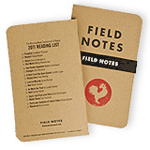by Aimee Bender
Doubleday
Buy at Powell’s »March 22, 2011
Howard Jacobson
Jennifer Egan
Judged by
As a basically grouchy, hypercritical person, I wasn’t expecting to enjoy either of these books. A “comic novel about anti-Semitism” sounded like a niche product designed for someone other than me; as for A Visit From the Goon Squad—interconnected, chronologically-scrambled short stories with recurring characters—I’d heard it described as “a display of Ms. Egan’s extreme virtuosity.” The word “virtuosity,” in book reviews, is a real red flag for me.
Perhaps relatedly, I’m suspicious of interconnected stories, which often remind me of the arbitrary, contrived tendency of literature, the tendency that poses a particular threat to the short story, a form where characters all too easily become interchangeable, and each plot seems like it might as well be a sequel or prequel to the one before.
 Buy anything from Field Notes from now until the end of the ToB and receive a special “reading list” memo book free, while they last. Use coupon code ROOSTER.
Buy anything from Field Notes from now until the end of the ToB and receive a special “reading list” memo book free, while they last. Use coupon code ROOSTER.Initially, my low expectations were borne out. The protagonist of Finkler, a mopey non-Jew called Julian, only dates emaciated women whose names start with J. He likes to imagine these women dying tragic, operatic deaths. Consistent with this interest in dying women, his two best male friends are (Jewish) widowers. One widower, Finkler, so embodies Julian’s idea of Jewishness that Julian takes to mentally replacing the word “Jew” with “Finkler.” This annoying convention is upheld by Jacobson, leading to such coinages as “Finklerish” and “Finkleress.”
In the first chapter, a fortune-teller warns Julian about a woman called Juno. When Julian asks Finkler whether he knows any women called Juno, Finkler quips: “D’jew know Jewno?”: a line repeatedly and mysteriously characterized as a particularly clever, particularly Jewish joke. “Julian Treslove knew he would never be clever in a Finklerish way,” Jacobson writes. “D’Jew know Jewno… he’d never be able to come up with something like that.” Some 40 pages later: “Then there was [Finkler’s] D’Jew know Jewno joke, designed to show [Julian] that when it came to linguistic virtuosity a non-Finkler didn’t hold a candle to a Finkler.” I don’t see the “linguistic virtuosity” in this pun, which (a) isn’t really a pun (the second “meaning” doesn’t actually mean anything), and (b) relies on the artificial conceits of a fortune-teller and a woman named Juno.
Turning to Goon Squad, I remembered the first story, about a kleptomaniac on a blind date, from the New Yorker. It was the kind of well-written, interesting New Yorker story that I read without pleasure, set in the “only in New York” version of New York, where youngish men and women, described without warmth or humor, pop Xanax or smoke pot to get over their embarrassment at the various depressing, embarrassing situations they keep ending up in.
After the first 50 pages, I was inclined to decide in favor of Goon Squad, less because I liked it than because it did a better job of being a “virtuosic” story collection than Finkler did of being a comic novel. This is in fact the decision I ended up with—but the latter two-thirds of both books were full of surprises. Finkler actually grew on me, no thanks to either the protagonist or the sub-plot involving a Jewish anti-Zionist organization called ASHamed Jews. (A side note: I loved Freedom, but I still think we should move away, as a culture, from novelistic subplots involving zany political organizations with zany names.) But Jacobson’s narration has an appealing, easy gentleness, and the two widowers’ marriages are finely observed, touching, and essentially mysterious, as observed marriages always are.
In the middle of Goon Squad’s fourth story, which involves a love triangle with a couple and their guide on a safari—a play on Hemingway’s “Short Happy Life of Francis Macomber”—I suddenly realized that I was reading a brilliant and wonderful book. The “goon” in the title, it turns out, is time—time that brutalizes, and ravages all things. Most of the recurring characters experience serious reversals and undulations of fortune—successes become spectacular failures and vice versa—in a way that somehow seems not artificial, but incredibly true. Egan makes you feel how time bends stories out of shape, gives them new, incongruous, beautiful, retrospectively inevitable endings. This is the kind of feeling you get from Proust or Tolstoy, but over hundreds, thousands of pages. I don’t think I’ve ever felt it from a short-story collection. “Virtuosity” is actually an apt word: You feel that Egan got so good at the form that she managed to get it to transcend itself—to make it historical, to make it do the work of the novel.
It’s also very much “a book of our times,” a book of our historical moment. I’m thinking less of the story told entirely in PowerPoint than of the character who predicts the coming of Facebook: “The days of losing touch are almost gone,” he says. “We’re going to meet again in a different place. Everyone we’ve lost, we’ll find. Or they’ll find us. I picture it like Judgment Day. We’ll rise up out of our bodies and find each other again in spirit form.” Goon Squad shows how, in a certain sense, we can’t lose track of people anymore—even as, in another, older sense, we eventually lose everything and everyone. It’s a beautiful, valuable achievement. Finkler has its moments, but Goon Squad carries the day.
Elif Batuman lives in Istanbul, where she is writer-in-residence at Koç University, and writes for the New Yorker. Her first book, The Possessed: Adventures With Russian Books and the People Who Read Them, was published in 2010. Known connections to this year’s contenders: “None!”